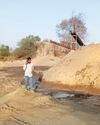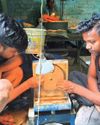
Sasthrakeralam
കോട്ടയം
ജില്ലകളുടെ ഭൗമശാസ്ത്രം
2 min |
SASTHRAKERALAM 2025 JULY

Sasthrakeralam
മയിക്കണ്ണിCommon Name: Junonia almana one Scientific Name: Peacock Pansy
വർണങ്ങൾ വാരിവിതറി പൂവുകൾ തോറും പാറിനടക്കുന്ന ചിത്രശലഭങ്ങൾ എത്ര മനോഹരമായ കാഴ്ചയാണ് ലോകത്ത് എത്രയോതരം ചിത്രശലഭങ്ങൾ ഉണ്ട്. അവയിൽ ചിലതിനെ പരിചയപ്പെടുത്തുന്ന പംക്തി.
1 min |
SASTHRAKERALAM 2025 JULY

Sasthrakeralam
അനിവാര്യമായ തിന്മ അല്ലെങ്കിൽ നന്മയ്ക്കായൊരു തിന്മ
ശാസ്ത്ര ജാലകം
2 min |
SASTHRAKERALAM 2025 JULY

Down To Earth
HOW LARGE IS SOVEREIGN DEBT?
Its burden on developing countries is growing twice as fast as on developed countries
4 min |
July 01, 2025

Down To Earth
CLOSE CALL
A Central Pollution Control Board report confirms Illegal mining on the Ganga river in Haridwar
3 min |
July 01, 2025

Down To Earth
A grove revived
It took 15 years for residents of Rajasthan's Sirawas village to bring to life a severely degraded sacred grove, an initiative that has triggered replicative efforts across the region
4 min |
July 01, 2025

Down To Earth
Deadly trail
Increased instances of humans being killed, and in many instances eaten, by tigers highlights a shift in the wild cats' behaviour due to ecological changes
6 min |
July 01, 2025

Down To Earth
Yet another washout
UN Ocean Conference sees limited progress, as SDG 14 remains the least funded global goal despite pledges and finance talks
6 min |
July 01, 2025

Down To Earth
Read the signs
Tribal communities believe that nature provides signs of the oncoming season, but climate change has made traditional weather forecast methods unreliable
3 min |
July 01, 2025

Down To Earth
Cultivating hope
Strapped for agricultural land in diamond-mined areas of Panna, women grow mushrooms at home for sustenance and livelihood
2 min |
July 01, 2025

Down To Earth
LOST IN MAIZE
Ethanol-blending programme and its spiralling impacts on food inflation, nutrition availability
3 min |
June 16, 2025

Down To Earth
World at risk of losing ice sheet, glaciars
THE ANTARCTIC ice sheet, which has the biggest potential for sea-level rise upon melting, may be at or very close to a tipping point, says a study published in Communications Earth and Environment on May 30.
1 min |
June 16, 2025

Down To Earth
May mayhem
The 2025 monsoon arrived a week early and raced across India in May, breaking records with its speed and intensity
5 min |
June 16, 2025

Down To Earth
World at risk of losing ice sheet, glaciars
THE ANTARCTIC ice sheet, which has the biggest potential for sea-level rise upon melting, may be at or very close to a tipping point, says a study published in Communications Earth and Environment on May 30.
1 min |
June 16, 2025

Down To Earth
THE BIG PICTURE
Restoring environmental flow in the Yamuna requires a comprehensive approach to watershed restoration, not just tackling the river's pollution
5 min |
June 16, 2025

Down To Earth
LOOPHOLE PLUGGED
On May 16, 2025, while hearing a case based on a petition by Vanashakti, a Mumbai-based non-profit, which questioned the validity of development projects initiated without environmental clearance (EC), the Supreme Court struck down two executive instruments issued by the Union environment ministry allowing ex post facto ECs, or retrospective clearance granted after a project had begun construction or operation. The court also barred the Union government from issuing any “new version” of the instruments—a 2017 notification and a 2021 Office Memorandum. Legal experts tell Down To Earth the judgement not only upholds principles of environmental law, but also holds the government accountable for its role in safeguarding the country’s environment.
7 min |
June 16, 2025

Down To Earth
The shape of water
Inspired by the idea of low-lying ponds at a sanctuary in the Thar, a Jodhpur environmentalist builds waterbodies in his village to allow the smallest of animals access to clean water
2 min |
June 16, 2025

Down To Earth
Reluctant to share
Even three decades after panchayats received constitutional status, states across India seem unwilling to share power with them
3 min |
June 16, 2025

Down To Earth
The mammoth in the patent system
Firms working on de-extinction of long vanished species are banking on wide patent protection to make colossal profit
4 min |
June 16, 2025

Down To Earth
Flood fix
Chennai is implementing sponge parks to mitigate waterlogging. But they may not be the best solution
3 min |
June 16, 2025

Down To Earth
GET THE BALANCE RIGHT
India currently relies on three major food crops—rice, maize and sugarcane—for ethanol production. Ethanol-blended petrol supports the country’s goals of carbon neutrality and energy sovereignty. But the transition to clean energy must not jeopardise food security.
6 min |
June 16, 2025

Down To Earth
TRICKY TRAJECTORY
Indirect emissions from land-use changes, overexploitation of water resources must not be ignored in the pursuit of biofuel
6 min |
June 16, 2025

Down To Earth
Artwork by nature
Once close to disappearance, Banda's shajar stone handicraft industry is on a revival path
4 min |
June 16, 2025

Down To Earth
MIND THE TRADE-OFF
In times of climate change, a careful roadmap must be drawn to plan how much of food crops can be diverted to fuel production
4 min |
June 16, 2025

Scientific India
Healing the Ozone Hole: A New Ally in Combating Climate Change
In a groundbreaking study published in Science Advances, researchers from the University of East Anglia (UEA) and the UK's National Centre for Atmospheric Science have unveiled a compelling link between the healing of the ozone layer and the Southern Ocean's capacity to absorb atmospheric carbon dioxide (CO2).
2 min |
May-June 2025

Scientific India
Antibiotics from Human Use Contaminating Rivers Worldwide, Study Finds
Anew study led by McGill University has revealed that rivers around the world are being contaminated by antibiotics from human use, creating risks for aquatic life and contributing to antibiotic resistance.
1 min |
May-June 2025

Scientific India
Scientists uncover 230 giant ocean viruses that hijack photosynthesis
Giant viruses play a role in the survival of single-celled marine organisms called protists.
1 min |
May-June 2025

Scientific India
How Bacteria Signal to Survive Antibiotic Attacks?
In the natural world, communication is often a key to survival—whether in animal herds, insect swarms, or even microbial colonies.
2 min |
May-June 2025

Scientific India
Sleep-in science: How 2 extra weekend hours can calm teen anxiety
A new study to be presented at the SLEEP 2025 annual meeting found that teens who get moderate but not excessive catch-up sleep on weekends have fewer symptoms of anxiety.
1 min |
May-June 2025

Scientific India
When Antibiotics Backfire: How Antibiotics Fuels Bacterial Resistance
Antibiotics have long been the cornerstone of modern medicine, designed to eliminate infections and restore health. But what if, instead of killing bacteria, these drugs were quietly helping them survive and even evolve?
2 min |